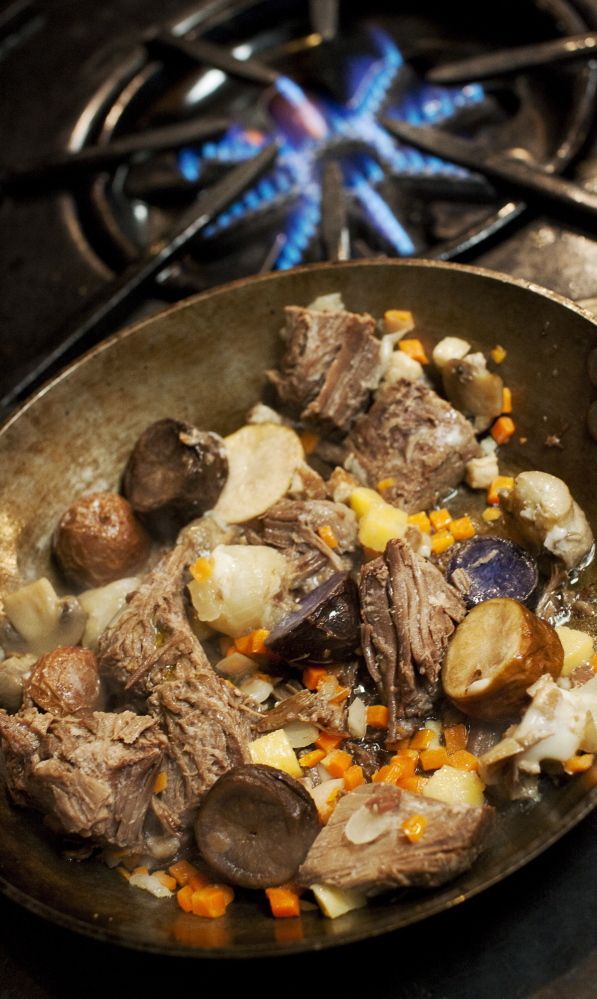Farm-to-table chef Benjamin Hasty, of Thistle Pig in South Berwick, has a counter-intuitive philosophy about keeping the amount of meat in warming winter stews to a sustainable level: He says to buy the biggest pieces of meat your local farmer has on hand.
In their recipes for stew, Fanny Farmer, Betty Crocker and Julia Child all recommend a minimum of 8 ounces of beef per person. While the cuts they suggested demonstrated an eye for frugality, consuming sustainably reared meat in smaller quantities for environmental reasons wasn’t a cook’s concern in 1896, 1950 or 1970, respectfully.
But today, Americans’ overconsumption of meat is linked to a host of environmental and health issues. Chefs around the country are focusing on vegetables and to some extent shunting meat aside. Short of that, they’re serving less of it.
In “Good Meat: The Complete Guide to Sourcing and Cooking Sustainable Meat,” Deborah Krasner whittles the per person portion down to 4 ounces. The stews in her book get beefed up with rich stocks; interesting herbs, vegetables and condiments; and smaller cuts of meat like oxtail and shins that come with bone, cartilage and marrow in tow.
“Yeah, there certainly is a lot of flavor in those little bad boys,” says Hasty, whose restaurant opened five months ago and has already gone through 16 whole pigs and two entire cows sourced from his father’s Breezy Hill Farm, also in South Berwick. The stews in Hasty’s repertoire include the Braised Beef Pot Au Feu with Dijon Mustard, Horseradish & Grilled Bread currently on his menu and Fast Beef Bourguignon. Each serving of those dishes at Thistle Pig has 4 to 6 ounces of meat.
Hasty contends that buying bigger hunks of beef like 4- or 5-pound shoulder roasts or bottom rounds is a sustainable practice if coupled with longer-term dinner planning. Home cooks can season these cuts with a favorite brine, rub or marinade, he says; cook them once using a slow, low-heat method to draw out the flavor and tenderize the meat; and, then divide the meat up to be served in several dishes over the course of the week, longer if the cooked meat is well wrapped and frozen.
When pressed about how much it might cost to pay for a large piece of pastured beef, he said the smaller cuts often brought to farmers markets are much more expensive per pound than the bigger cuts bought right on the farm. Hasty says his father sells most of his beef from the farm for between $2.50 and $8 per pound.
“But you have to buy what’s available. A good stew recipe gives you that kind of flexibility,” said Hasty.
FAST BEEF BOURGUIGNON
Boeuf bourguignon is typically a long, slow winter braise requiring 3 to 4 hours in the oven. Chef Benjamin Hasty speeds up the dish by using leftover braised meet, cutting the total time for his version to under an hour. Hasty suggests serving the stew with grilled bread, mustard and/or horseradish.
Serves 4
2 large carrots
2 medium potatoes
3 tablespoons canola oil
16 to 24 ounces cooked beef, cut into 1-inch cubes
Flour or cornstarch to dredge
4 strips of thinly sliced bacon, diced
1 cup button mushrooms, cut into quarters
1 garlic clove, smashed
2 tablespoons tomato paste
1 cup red wine
4 cups beef stock
1 cup frozen pearl onions
2 tablespoons softened butter, in pieces
1/4 teaspoon minced thyme leaves
Black pepper and kosher salt
Peel and slice carrots into ¼-inch discs. Peel and cut potatoes into ½-inch cubes. Place a steam basket in a medium-sized pot, add one inch of water to the pan. Layer the carrots into the basket first and top with the potatoes. Place the pot, covered, over medium-high heat. Steam vegetables until tender, 12 to 15 minutes, then set aside.
As the vegetables cook, heat the oil in a large Dutch oven over hight heat until smoking. Meanwhile dredge cooked beef in flour or cornstarch.
Add the dredged beef, bacon, mushrooms and garlic to the oil. Cook until the coating on the beef is browned, the mushrooms are caramelized, and the bacon has rendered its fat and begun to crisp, 5 to 7 minutes. Stir in tomato paste and cook for 1 minute.
Add wine and reduce heat to medium. Reduce wine by one quarter, 3 to 4 minutes.
Add stock, turn heat to medium high, reduce the liquid by half, about 15 minutes. Add the onions, carrots and potatoes, bring the mixture back up to a simmer, and cook until the liquid in the pot can coat the back of a spoon, about 20 minutes. Remove from heat.
To finish the sauce, whisk in butter to emulsify and form a silken sauce. Add fresh thyme and adjust seasoning to your liking with salt and pepper.
Christine Burns Rudalevige is a food writer, recipe developer and tester, and cooking teacher in Brunswick. She writes about feeding her family Maine seafood at www.familyfish.net. Contact her at cburns1227@gmail.com.
Send questions/comments to the editors.


